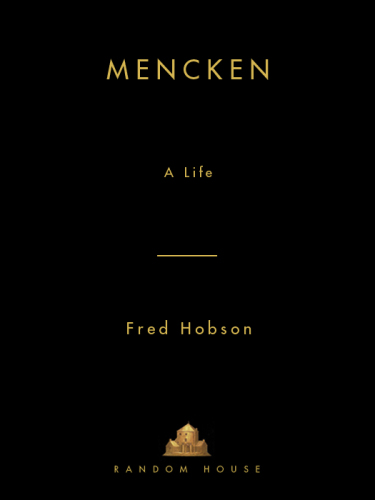
Mencken
A Life
کتاب های مرتبط
- اطلاعات
- نقد و بررسی
- دیدگاه کاربران
نقد و بررسی

May 2, 1994
This skillful and painstakingly detailed life of Henry Louis Mencken will serve as an important source for Mencken readers and scholars. Hobson had access to an enormous archive of material--including the recently released My Life As Author and Editor --all provided conscientiously by the subject himself. Mencken (1880-1956) lived almost his entire life in the city he called ``the most livable of any on earth'': Baltimore. Hobson ( Serpent in Eden: H. L. Mencken and the South ) does a balanced and convincing job of letting his subject speak for himself and yet also of pointing out the gaps in the self-portrait. Mencken's German background, he notes, only partially accounts for his admiration of Hitler and his outspoken dislike of all things British. Hobson readily admits Mencken's anti-Semitism yet discusses it alongside his frequent aid to fellow writers of every religion and race. His turbulent friendship with Theodore Dreiser threads its way through the biography as does his long and mutually profitable relationship with his publisher Alfred A. Knopf. No matter how much one may admire Mencken's witty prose and his excoriation of society's foibles, it is hard to feel affection for this hypocondriacal curmudgeon as he turns against old friends and entangles women in his web of words: Marion Bloom, his greatest epistolary love, saved hundreds of his letters despite Mencken's prohibition, while he destroyed hers; his brief marriage to Sara Haardt was overshadowed by her fatal illnesses. Mencken chronicled his own life so fully in Prejudices and in his autobiographical trilogy that this enormous biography seems almost gratuitous, but it places Mencken firmly in his times and among his circle in a broader context than do his own caustic reflections. Photos not seen by PW.

Starred review from February 15, 1994
Relying on newly available writings from the Mencken archives, Hobson ( Serpent in Eden: H.L. Mencken and the South, 1974) has painted a fascinating portrait of the "Billy Sunday of American literary criticism." In rich, and sometimes exhausting, detail, the author explores Mencken's family relationships, friendships with other writers, marriage to Sara Haardt, and manic attitude toward his work as central to the moral and political ambiguities that marked his life and work. A final chapter on Mencken's "posthumous life" is of particular interest. Hobson's study is an interesting companion piece to Mencken's My Life as Author and Editor (Knopf, 1992), and it will likely serve as the standard Mencken biography for many years to come. Highly recommended.-- Henry L. Carrigan Jr., Westerville P.L., Ohio

Starred review from March 1, 1994
Tackling Mencken in all his verbal prolifigacy, pomposity, and blood-boiling opinionatedness demands sangfroid from a biographer, which, happily, Hobson has. His life is fully fleshed, benefiting from Menckenia kept secret until the past decade, including Mencken's "My Life as Author and Editor." Yet, as Hobson explains, his task was not just to fold the new into old biographies (the last one dates from 1969) but to penetrate beneath the persona that Mencken himself created, notably in his autobiographical "Days" trilogy from the 1940s. Not all was happy in his youth, and Hobson sensitively reconstructs the teenage sage-to-be, evoking a period--when his father hoped to groom him for the family's cigarmaking business--that the mature Mencken preferred to forget. Then there are Mencken's loves, including one Marion Bloom from whom he cruelly but resolutely severed relations--a habit of his when estrangement set in. Novelists such as Dreiser, Lewis, and Fitzgerald felt Mencken's lash, along with those enduring objects of his derision and invective: Rotarians, moralists, and politicians. Prejudiced? Yes, against Jews, blacks, and poor whites, concludes Hobson about this attractively infuriating elitist. Having sifted all sources and melded them into this superb profile, Hobson has captured the character, contradictions, and lasting influence of the man in what will surely become the standard biography. ((Reviewed Mar. 1, 1994))(Reprinted with permission of Booklist, copyright 1994, American Library Association.)

























دیدگاه کاربران